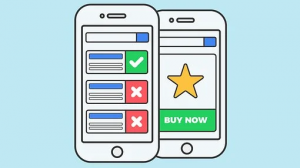Data security checklist for e-commerce or online store
Running an e-commerce business or online store means pursuing business over the internet using the World Wide Web (WWW). E-commerce businesses have been scaling new heights of popularity nowadays, and this trend has also brought a lot of data security and privacy issues to the forefront. As a direct outcome of these data security concerns, users are now refusing to engage in online transactions unless the online store combats these issues.
Many e-commerce businesses are exploiting user privacy to grow their business. Now, privacy may mean different things to different people. Irrespective of what defines data privacy for a user, he/she is now increasingly concerned about any unauthorized reuse of his/her data. You now have to be specific about your data security and privacy strategy – for instance, sharing or selling user data. Even if you end up compromising user data due to a security breach or a cyberattack, it means you failed to ensure the privacy of user data, and you may even be liable for legal action, besides loss of reputation and customers.
User’s trust and growth of your online store are largely dependent on the safety of your website. This means that the security policies and mechanisms your e-commerce store adopts are the most critical factors in the success of your online business. If you fail to provide full protection for user data, your customers will not transact on your website and your online venture is bound to fail.
Here are a few things to keep in mind to protect your website and user data:
Limit Data Collection
One of the cornerstones of avoiding serious consequences related to data breaches is to hold on to the least amount of data collected from customers. If you think about it, most online stores may be able to work with just a customer mailing list – no need to ask for name, birthday, or phone number to keep them informed of availability of new or “out of stock” items.
It is best to stay away from retaining any financial information, such as credit card numbers and bank accounts. Yes, it may make your checkout process easier and the customers may find it convenient to complete their purchases just after logging in and adding items to their shopping cart, without having to enter their payment details again. However, this comes at a high potential risk – think about the costs of losing this sensitive information to a leak.
In fact, you are violating the PCI (Payment Card Industry) data security standard by storing data related to credit cards. PCI standard council is an international body that is responsible for laying down standards to be adopted for security of payment accounts. Every credit card brand in the world is required to adhere to this security standard and as an online business; you will find it impossible to operate online without complying with it.
If you still decide that you want to provide your customers with the ease of storing credit card data, consider using a 3rd party payment system, such as PayPal or some other online reputed payment gateway. This will help you outsource your security risk to a more competent entity.
Use trusted platforms and software
Make sure that you host your website on a secure platform. Check the credentials of your web hosting company to ensure you understand the mechanisms offered and implemented for securing your data. Do not work with a hosting company that has a history of breaches and does not use the best industry practices for website security.
Do not make use of any software or plugins that are not sourced from a legitimate source you can trust. Keep automatic software updates turned on, so your website is always protected by the latest security patches.
Make sure your systems are free from virus and malware – run checks periodically and also enable live security for all data transfers.
Use SSL certificates
The most cost-effective and easiest thing to protect user data is to install an SSL certificate on your web server. SSL (Secure sockets layer) authenticates your business’s identity and encrypts all data being exchanged between the web server and user browser.
Once the users can trust that they are dealing with the online business you claim to be, they are assured that they are not on a fake website – this makes them more comfortable in sharing their information with your online store. Also, encryption of data in transit means that even if some hacker was to somehow place themselves between the web server and user browser, they won’t be able to make any sense of the data they get hold of. This makes the MITM (Man in the middle) practically toothless and the cyber attack does not lead to any data pilferage.
Here is a useful tip to help you save money and management overhead if you need to protect multiple subdomains. Use the cheapest wildcard SSL certificate to protect all your subdomains. For instance, a wildcard SSL certificate issued for *.mysite.com will cover blogs.mysite.com, shopping.mysite.com, and so on.
SSL is also a key requirement of PCI compliance. Also, it boosts your SEO (Search Engine Optimization) ranks to help you get more organic traffic – which is not only free but also targeted to what you are offering; you have a better chance of converting.
Limit access
Limit the number of people and systems that can access sensitive websites and user data. Place additional constraints like 2-factor authentication and ACLs (Access control lists).
Ensure such data is not placed in obvious locations – make it hard for someone to accidentally stumble on sensitive data. If it is not necessary to retain this on your internal network, consider using a secure cloud solution.
Pick the employees for your core security circle carefully and divide them into different security groups – allowing them access to varying levels of data that they need to access.
Conduct regular employee training to keep them updated with the latest security policies and ensure compliance.
Enforce strong passwords
Do not allow the use of “easy to guess” dictionary words or usernames as passwords. Enforce strong password policies to ensure the passwords are long, use random sequences of upper-case characters, lower case letters, numbers, and special characters, and need to be changed periodically.
These policies should govern not only employee access but also cover customer logins.
Encrypt stored data
No matter what you do, it is impossible to get to 100% security – the cybercriminals are getting sophisticated by the day and sooner or later, you are likely to be under a cyberattack. Always encrypt your website and customer data in your databases and other data stores.
This way, even if a hacker was to get their hands on your data storage systems, they will not be able to make sense of the information, and hence cause no harm.
Regular backups
This is another thing that will save the day in case you are hit by a cyberattack or your site goes down. Having access to the latest backup will make it easy for you to recover from the situation quickly and get online before the interruption hurts your online business.
Make sure the backups are stored in a site different from the main website, so you can get to it even if the primary location is compromised.
Lastly, do not take security lightly. Any data breach can prove to be suicidal for your e-commerce business. Protect your website data and customer information. Use the tips outlined above to achieve data security for your online store.







